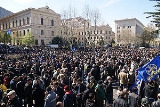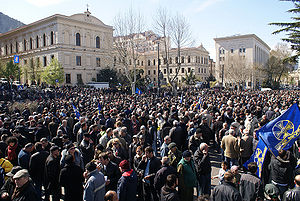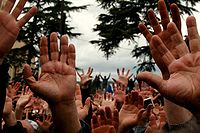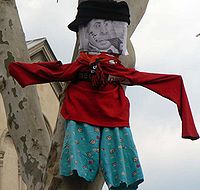
2009 Georgian demonstrations
Encyclopedia

Georgia (country)
Georgia is a sovereign state in the Caucasus region of Eurasia. Located at the crossroads of Western Asia and Eastern Europe, it is bounded to the west by the Black Sea, to the north by Russia, to the southwest by Turkey, to the south by Armenia, and to the southeast by Azerbaijan. The capital of...
against the government of President Mikheil Saakashvili
Mikheil Saakashvili
Mikheil Saakashvili is a Georgian politician, the third and current President of Georgia and leader of the United National Movement Party.Involved in the national politics since 1995, Saakashvili became president on 25 January 2004 after President Eduard Shevardnadze resigned in a November 2003...
. Thousands of people demonstrated, mainly in Tbilisi
Tbilisi
Tbilisi is the capital and the largest city of Georgia, lying on the banks of the Mt'k'vari River. The name is derived from an early Georgian form T'pilisi and it was officially known as Tiflis until 1936...
, starting on 9 April 2009, demanding Saakashvili's resignation. On the first day of demonstrations, up to 60,000 people gathered in Tbilisi. Opposition activists had expected some 100,000 - 150,000 participants. Protests continued for over three months, although fewer people participated as time passed than during the first days. On 26 May 2009, the Georgian independence day, 50,000 protesters took part. Although peaceful at first, there were incidents of fighting between the Georgian police and protesters. The daily rallies gradually dwindled and ended on July 24, 107 days after they kicked off.
Opposition plans
On 27 March 2009, 13 opposition parties agreed to hold a joint rally to demand Saakashvili's resignation in an announcement named Manifesto of Unity. It was signed by Alliance for Freedom (uniting Party of Freedom; Party of Women for Justice and Equality; TraditionalistsUnion of Georgian Traditionalists
Union of Georgian Traditionalists was a national political organization of the Georgian Political Emigration in 1930s.The Union was established in 1942, in Berlin...
and Party of Future); Conservative Party
Conservative Party of Georgia
The Conservatives Party of Georgia is a centre-right and nationalist political party, active in Georgia since 2001.Currently led by its acting chairman Zviad Dzidziguri, the party had been allied with Mikheil Saakashvili’s United National Movement until May 2004 when it switched into opposition...
(leaders – Kakha Kukava
Kakha Kukava
Kakha Kukava is a Georgian politician, former member of Parliament of Georgia and a leader of Conservative Party of Georgia.-Biography:...
and Zviad Dzidziguri); Democratic Movement–United Georgia (led by Nino Burjanadze
Nino Burjanadze
Nino Burjanadze is a Georgian politician and lawyer who served as Chairperson of the Parliament of Georgia from November 2001 to June 2008...
); Georgia's Way
Georgia's Way
Georgia's Way is a political party in Georgia. It was registered on March 11, 2006. The chairman of the party was former Georgian Foreign Minister Salome Zourabichvili, who was sacked by Prime Minister Zurab Nogaideli in October 2005. On November 12, 2010 Zourabichvili announced her resignation...
(led by Salome Zourabichvili
Salome Zourabichvili
Salomé Zourabichvili is a Georgian politician, from 2004 to 2005 Foreign Minister of Georgia and a former diplomat in the French service. Currently she is the Coordinator of the Panel of Experts assisting the UN Security Council’s Iran Sanctions Committee.-Biography:Zourabichvili was born in...
); Industrialists Party
Industry will save Georgia
The Industry Will Save Georgia is a conservative political party in Georgia....
(led by Zurab Tkemaladze and beer magnate Gogi Topadze); Movement for United Georgia
Movement for United Georgia
The Movement for United Georgia is a Georgian political party founded by former Defense Minister Irakli Okruashvili on 27 September 2007. It is opposed to the current President Mikheil Saakashvili's supposed trend towards authoritarianism...
(founded by ex-defense minister Irakli Okruashvili
Irakli Okruashvili
Irakli Okruashvili is a Georgian politician who had served on various important posts in the Government of Georgia under President Mikheil Saakashvili, including being the Minister of Defense from December 2004 until being dismissed in November 2006.In September 2007, Okruashvili staged a...
); Party of People (led by Koba Davitashvili
Koba Davitashvili
Koba Davitashvili is a Georgian politician, prominent member of Georgian opposition, member of Tbilisi City Assembly and a leader of Geororgian Peoples Party.-Early life and career:...
); and the Alliance for Georgia, uniting New Rights, Republican Party
Republican Party of Georgia
The Republican Party of Georgia , commonly known as the Republicans , is a political party in Georgia active since 1978. It is currently in opposition to Mikheil Saakashvili’s government...
and a political team of Irakli Alasania
Irakli Alasania
Irakli Alasania is a Georgian politician and former diplomat. He was Georgia’s Ambassador to the United Nations from September 11, 2006, until December 4, 2008. His previous assignments include Chairman of the Government of Abkhazia and the President of Georgia’s aide in the Georgian-Abkhaz talks...
, who had earlier showed reservations about joining the manifestations. Levan Gachechiladze
Levan Gachechiladze
Levan Gachechiladze is a Georgian politician and businessman who ran as the main oppositional candidate in the 5 January Georgian presidential election, 2008.-Life and family:...
, a former opposition presidential candidate, has joined the document as an individual politician.
According to Eka Beselia, a spokeswoman for the For a United Georgia party, the protest is intended to change power in a constitutional way. "The action will be halted only when the power of Saakashvili comes to an end. We'll force him by a peaceful but nation-wide protest to resign," Beselia said on 13 March. Salome Zourabichvili stressed on 8 April, that the demonstrators will remain on the streets until the president steps down.
The date of 9 April 2008, was chosen because it will be the 20-year anniversary of the day when 20 people died as Soviet Red Army troops dispersed a pro-independence rally in Tblisi.
Opposition parties have accused Saakashvili of concentrating power to himself, using riot police to crush opposition rallies in 2007
2007 Georgian demonstrations
The 2007 Georgian demonstrations were a series of anti-government protests in Georgia. The demonstrations peaked on November 2, 2007, when 50,000-100,000 rallied in downtown Tbilisi, capital of Georgia. People protested against the allegedly corrupt government of president Mikheil Saakashvili...
and for the disaster of the 2008 South Ossetia war
2008 South Ossetia war
The 2008 South Ossetia War or Russo-Georgian War was an armed conflict in August 2008 between Georgia on one side, and Russia and separatist governments of South Ossetia and Abkhazia on the other....
. "I don't think that it should be a surprise that after we lost 20% of Georgian territory and have no democracy in the country, we are asking for the resignation of the president," opposition leader Nino Burjanadze said.
Preparations
On 8 April, the Tbilisi-based pro-opposition Maestro TV aired a brief video, informing the public that the opposition and their supporters will start gathering at three various venues in the capital city – in Avlabari Square, Tbilisi State UniversityTbilisi State University
Ivane Javakhishvili Tbilisi State University , better known as Tbilisi State University , is a university established on 8 February 1918 in Tbilisi, Georgia. TSU is the oldest university in the whole Caucasus region...
and at the public broadcaster
Georgian Public Broadcasting
Georgian Public Broadcasting is the national public broadcaster of Georgia. It started broadcasting radio in 1925, and Georgian TV started broadcasting in 1956. Today, 85% of the Georgian population receive the First Channel , and 55% receive the Second Channel...
’s office subsequently to join outside the Parliament
Parliament of Georgia
Parliament of Georgia is the supreme legislature of Georgia. It is unicameral and has 150 members, known as deputies, from which 75 members are proportional representatives and 75 are elected through single-member district plurality system, representing their constituencies...
in Rustaveli Avenue
Rustaveli Avenue
Rustaveli Avenue - is an avenue in central Tbilisi named after the medieval Georgian poet, Shota Rustaveli. The Avenue starts at Freedom Square and extends for about 1.5 km in length, before it turns into an extension of Kostavas Kucha...
.
Foreign diplomats have called for a dialogue between the government and opposition, and the Georgian Orthodox Church has urged the opposition, the government and the Georgian army not to resort to force.
On 8 April 2009, Georgian police set up a Monitoring Center to oversee the rallies and invited foreign diplomats to keep a close eye on police and protesters’ actions. The office of Georgian public defender Sozar Subari
Sozar Subari
Sozar Subari is a Georgian journalist and human rights activist who served as a Public Defender of Georgia from 2004 to 2009....
and a group of local non-governmental organizations will also monitor the events. Irakli Alasania, leader of the Alliance for Georgia, said that the opposition was willing to cooperate with the law enforcement agencies to provide security during the rallies.
President Saakashvili has stated there was "no alternative to dialogue" and the government was ready to talk even "with the smallest and the most radical group". The Georgian Interior Minister Vano Merabishvili
Vano Merabishvili
Ivane Merabishvili is a Georgian politician who has served as the country’s Ministry of Internal Affairs since December 18, 2004...
said that the authorities would show "maximum tolerance" towards the protesters and police would retaliate in case of the opposition attempts at storming the government buildings. Fire crews and hundreds of police in full riot gear were positioned on the courtyard of the parliament in central Tbilisi in early 9 April.
First day of demonstrations

Second day of demonstrations
On 10 April, about 20,000 people took part in the rally in Tbilisi. The opposition announced the start of a national disobedience campaign. Major roads in Tbilisi were blocked off for six hours, causing the traffic in the city to paralyze. The opposition said that the same action will be repeated every day.Continued protests

On April 13, 2009 the protesters set up camp outside President Saakashvili's office. and the opposition leaders stated they were ready to hold talks with the president but that an election was the only way out of the deadlock.
Opposition leaders have pledged to keep the protests peaceful but on May 6, 2009 protesters and police clashed near a police base. The Interior Ministry said 22 protesters and six policemen were injured. The opposition said several of its leaders were also treated in hospital. Protesters appeared to have converged on the police base to demand the release of three opposition activists detained over the beating of a journalist on May 5, 2009.
On 26 May 2009, the Georgian independence day, 50,000 protesters gathered to demand Saakashvili's resignation. The opposition has also forced the government to cancel the annual military parade. Opposition leaders still insisted that protests will continue until Saakashvili resigns. Saakashvili, on his part, reiterated his refusal once again.
On 28 May 2009, several protesters and five policemen were injured in a clash close to the protest venue outside the Parliament. According to the Georgian government, least one police officer was stabbed and others were beaten. However, the opposition denied the report, saying some 20 plainclothes police attacked its supporters with batons. Television pictures aired by Maestro TV showed dozens of men in civilian clothing clashing with each other on a small street near the Parliament. Opposition leader Kakha Kukava said the clash was "a provocation by a group of policemen who started beating people." Television pictures showed several wounded protesters, one with blood streaming from his head.
Mid June 2009 Georgian police clashed violently with opposition protesters in Tbilisi.
International response
At a meeting of the 28 NATO states and their Georgian counterpart in BrusselsBrussels
Brussels , officially the Brussels Region or Brussels-Capital Region , is the capital of Belgium and the de facto capital of the European Union...
on May 5, 2009 NATO called for dialogue between Georgia's government and opposition, for reforms to ensure freedom of media and assembly, and for the government to avoid violence against protests.
Effects on the Georgian economy
On 7 April 2009, Fitch RatingsFitch Ratings
The Fitch Group is a majority-owned subsidiary of FIMALAC, headquartered in Paris. Fitch Ratings, Fitch Solutions and Algorithmics, are part of the Fitch Group....
had warned that Georgia's long-term credit could be downgraded because of the political instability ahead of the planned protests. April 9, 2009 the Prime Minister of Georgia
Prime Minister of Georgia
The Prime Minister of Georgia is the most senior minister within the Cabinet of Georgia, appointed by the President of Georgia. The official title of the Head of the Government of Georgia has varied throughout history, however, the duties and functions of the leader have changed only marginally....
Nika Gilauri warned that political standoff and protest rallies in the country would hit the Georgian economy.

